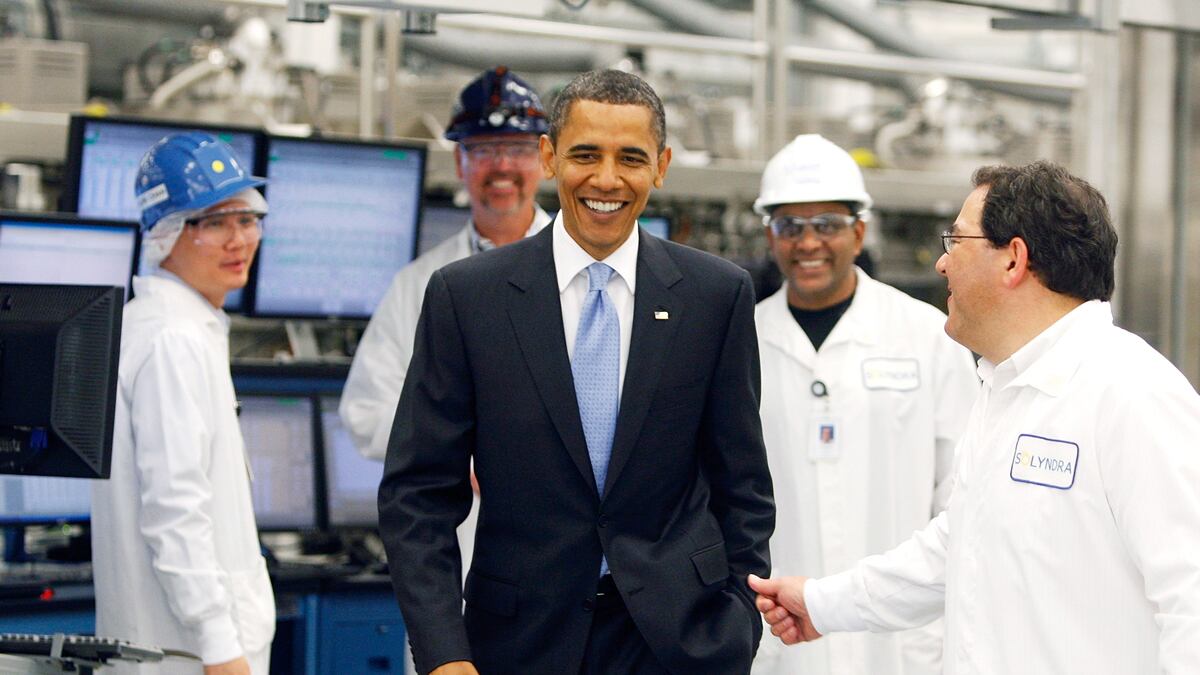Both political parties are talking about cronyism and insider dealing. But it’s only talk, because they are unwilling to take the steps necessary to clean up their own houses.

Begin with the Obama administration. Its leaders are quick to embrace the rhetoric of attacking Wall Street, the wealthy, and their insider deals. But they refuse to acknowledge that with taxpayer dollars, they gave stimulus money to projects funded by some of their biggest donors. Look, for example, at the great reporting done by CBS News on the subject of 12 clean energy projects and who is connected with them.
In the famous case of Solyndra, newly released emails reveal what the feeding trough looks like. In July 2009, George Kaiser bragged about how he was able to meet with “all the key players in the West Wing of the White House,” and the “almost unique advantage” he enjoyed in getting access to taxpayer money. As he put it in a speech at the Oklahoma Rotary Club, “There’s never been more money shoved out of the government’s door in world history, and probably never will be again, than in the last few months and in the next 18 months. And our selfish, parochial goal is to get as much of it for Tulsa and Oklahoma as we possibly can.”
The administration, of course, denies everything and doesn’t want to talk about this. And Obama allies deny that anything was wrong with this. They would all rather talk about Romney.
Indeed, the watchdog press has not functioned as a watchdog at all. Over at Time magazine, Michael Grunwald declares that the stimulus has been “a well-managed thing” and explains that there have been few documented cases of criminal prosecutions for fraud. This, he says, is evidence that there were no “sweetheart deals.” But of course, cronyism is not illegal. The absence of fraud prosecutions says nothing about loans and grants going to friends because that sort of behavior is not fraud. One can only wonder: will Grunwald take such trusting positive attitude toward taxpayer loans and grants being steered to campaign supporters if we have a Romney administration?
The other side of the partisan divide is guilty of the same sort of inconsistencies. Mitt Romney has been slamming the Obama administration on these issues, running ads and giving speeches on the dangers of cronyism and crony capitalism. Good for him in raising the issue. But how committed is candidate Romney to going past the talk? After he spoke about the issue, he couldn’t name a single ethics reform that he would initiate to deal with the problem. Huh?
Of course cronyism thrives when it comes to a lack of transparency. Romney still refuses to reveal the names of his campaign bundlers. He’s released the names of his bundlers that are registered lobbyists (he’s required to do so by law), but not everyone else. The fact that the big winners of the Obama administration’s largesse were campaign bundlers seems lost on the Romney campaign. And Governor Romney won’t admit that maybe it was wrong for him as governor to practice cronyism by steering (albeit much smaller) Massachusetts state loans to favored companies. After all, the Romney campaign would rather talk about Obama’s cronyism than discuss any of this.
Right now cronyism is an “issue.” Recognizing that people are fed up and have a total lack of faith in their governing institutions, candidates are trying to use cronyism as a cudgel against their opponents. No doubt these issues test well with focus groups. But with cynicism rampant, most informed voters are going to look past the words and posturing and look for individuals who actually are willing to institute and embrace transparency and reject cronyism. How about committing to these basic reforms for starters:
1. No government loans or grants to firms or entities connected to campaign bundlers and large financial supporters.2. Complete transparency when it comes to campaign financiers and bundlers.3. No campaign fundraising from large government contractors.
Easy, clean, and simple. It’s a good place to start.
I think the candidate who comes clean, embraces transparency, and admits to past acts of cronyism, will turn this from an “issue” into a “truth” that we can actually tackle and deal with. Everyone in Washington professes to hate cronyism. Yet when they engage in it they call it “donor relations.”






